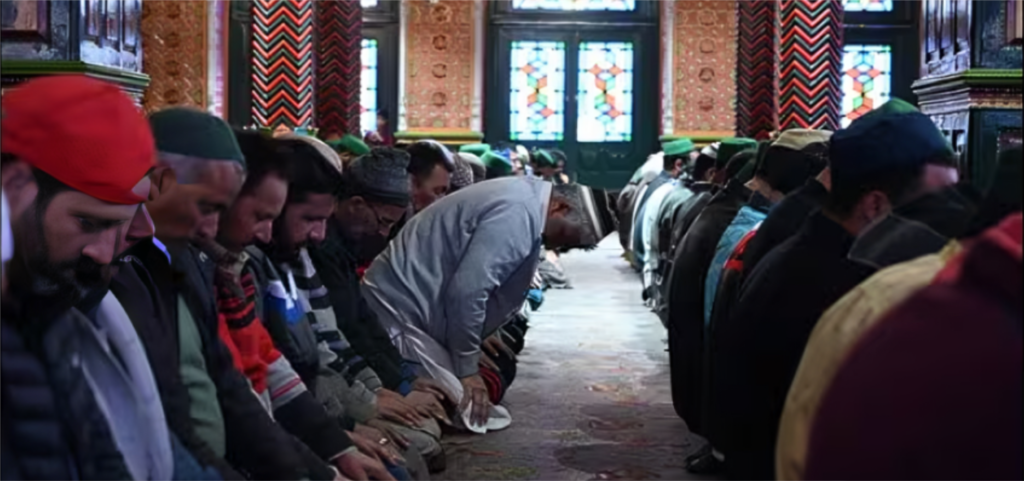
WHAT IS HAPPENING IN KASHMIR?
OUR SEDITIOUS MOON
Muhammad Yaqoob Mirza
Since our occupiers decided to revoke the semiautonomous status of our homeland, there has been an unprecedented surge in anti-Kashmir and anti-Islam projects. India has employed different stooges and proxies to remain at the forefront of such projects who now decide how and when a Kashmiri should act, behave and live in the region. Last year, a controversy arose regarding the announcement of Eid, with government-appointed muftis striving to declare the blessed day for Kashmiris in line with the wishes of our oppressors. Historically, Kashmir has celebrated Eid with Pakistan. For decades, we have eagerly awaited the announcement from Pakistan’s Ruet-e-Hilal Committee on our radio and television sets to mark this holy day. Our occupiers have long been uneasy about Kashmiris celebrating Eid with Pakistan, for they view it as a de facto referendum by the local population.
Now that the Indian occupying state, with BJP in power at center since more than a decade, has tightened its grip on the region using iron fist policies, they are in no mood to allow Kashmiris to continue with their historical stand on this holy day. The announcement of Eid from Pakistan and India was interesting this year. Most Muslim countries across the globe including Saudi Arabia, UAE, Qatar and Pakistan declared that Eid will be celebrated on 10th of April while India announced that the Shawal Moon was not sighted in most of the cities and hence Eid will be on 11 April. Pakistan’s announcement came minutes after India had declared that its Muslim population was going to celebrate the day on 11 April in the country. Kashmiris were watching this space curiously and after Pakistan’s announcement, their joy knew no bounds—not merely because Eid was imminent, but because they could celebrate the day without the country that illegally occupies their land.
India was not happy at all with the developments unfolding before its eyes. Although India did not officially prohibit Kashmiris from choosing to celebrate Eid with Pakistan, it has now decided to penalize Kashmiris for their historical alignment with Pakistan on this matter. The military administration has opted to deduct a day’s salary from all government employees and place them on leave on 10th April, instead of declaring it a holiday in the occupied territory. Kashmiris see this as the military administration’s first official move to discourage their allegiance to Pakistan on this significant religious occasion. It’s important to note that the region, historically, geographically, and religiously, is more aligned with Pakistan than India. There is no religious, scientific, or geographical obligation compelling them to align their Eid celebrations with any country other than Pakistan.
India has established its own Ruet-e-Hilal Committee in the occupied territory and appointed a controversial religious cleric with a questionable past as its head to challenge Kashmiris on moon-sighting matters. Interestingly, unlike Pakistan, the government-appointed mufti lacks modern equipment for clearer Shawwal moon observation! It’s also important to note that the occupying state has taken several prominent religious organizations under its direct control. The religious leaders of these organizations communicate directly with BJP’s Darakhshaan Andrabi and core central and state agencies on crucial issues. The Waqf Board, chaired by Andrabi, directly oversees religious matters in the region.
After 2019, India imprisoned numerous prominent religious clerics across Jammu and Kashmir. Before the abrogation of Articles 370 and 35A, India also banned the major religious organization, Jamaat-e-Islami Jammu Kashmir, and incarcerated its core members in various jails across India and Kashmir. Recently, following an alleged agreement among the religious leaders of various organizations, except Jamaat-e-Islami, they were released from jail. They were permitted to resume their religious duties without speaking out against Indian occupation or human rights abuses in the region. After their release, these religious leaders were visited by notorious BJP figures and presented with flower garlands and Kashmiri shawls. The ban on Jamaat-e-Islami JK was extended for another five years in February by the Ministry of Home Affairs, and the organization’s core members continue to languish in jail without any bail.



